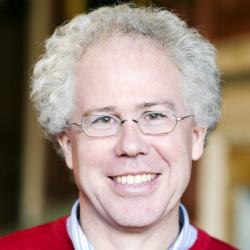On Turing and Learning Machines
Wednesday 18 November 2020, 15:00–17:00 GMT
Overview
Co-facilitators: Dr Sarah Dillon (English, Cambridge), Dr Richard Staley (HPS, Cambridge)
Assigned texts
- Samuel Butler, 'The Book of the Machines', Chpts. 23–25 of Erewhon: Or, Over the Range (1872) London: Trübner & Co., pp. 224–260. Free eprint.
- A.M. Turing, 'Nature of Spirit' (1932) Essay written during a visit to Clock House, Bromsgrove (home of his friend Christopher Morcom) [Apr. 1932], The Turing Digital Archive, King's College, Cambridge, AMT/C/29.
- A.M. Turing, 'Intelligent Machinery' (1948) in D. C. Ince (ed.), Mechanical Intelligence, Collected Works of A.M. Turing, North-Holland, 1948, 107–27. A copy of the typescript manuscript.
- A.M. Turing, 'Computer Machinery and Intelligence' (1950) Mind, 59, 433–60.
Synopsis
Moving from the late nineteenth century through to the first half of the twentieth century, our readings this month focus on a key figure in the history of AI: Alan Turing. The session proceeds in three parts. In the first part, we collectively discuss the texts in relation to the Seminar's four themes – encoded behaviour, disingenuous rhetoric, hidden labour and cognitive injustice. In what ways can the texts inform discussion of these themes? Conversely, how does approaching the texts in the light of these themes open them up in productive and interesting ways? In the second part, we split into smaller break-out groups which will engage more closely with the texts, to consider what historical arguments can be constructed from reading them. In the final part, we come back together to share some of these proposed historical arguments, but also to discuss what these two approaches to the texts (our thematic framings, and a historical approach) might miss out or overlook.
Event summary
Dr Dillon and Dr Staley conducted this session in three parts.
- In their introduction, Dr Staley provided some historical context to the assigned readings, while Dr Dillon presented the approach of practical criticism toward reading the texts.
- In the first part, the community engaged in an application of critical theory to the four assigned texts, with reference to the four themes of the seminar series. Discussions involved the texts' evidence of hidden labour in racialised capitalism, Darwinian conceptions of life (and artificial life), embodiment, the relevance of Turing's personal life to aspects of his writings, and the continued centring of Turing in histories of artificial intelligence.
- In the second part, the community was divided into breakout rooms. These sub-groups were tasked with constructing an historical narrative based on the assigned texts. Findings covered the cultural rhetorical devices against which Turing defined computing, Turing's Orientalism, tensions between the organic and the mechanical, the evidence of unqualified or arrogant assumptions about 'the human', and religion and secularism.
- In the third part, following the return from breakout rooms and feeding back on tasks, the community thought together about what might be missing in the approaches to historical arguments used in the session. Participants developed interdisciplinary conversations about the scientific aspect of these texts, relating them primarily to computer sciences and cognitive sciences. This discussion also focused heavily on the strategic and political construction of historiography, furthering conversations from the first part of the session.


